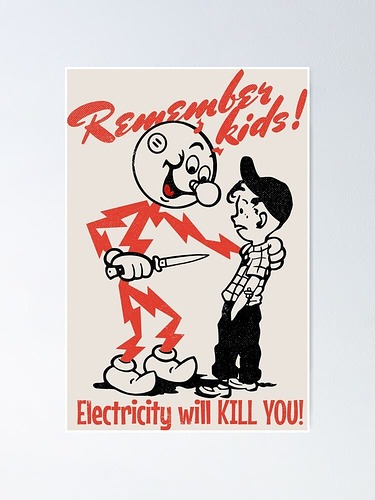Originally published at: Firefighters rescue electrocuted man trying to steal wire from top of power tower | Boing Boing
…
Good to know they’re not all Florida men I suppose.
You can tell this was definitely a Pennsylvania Man because he used the Pennsylvania Man Excuse of “something involving deer.”
ProTip for those who live outside the state:
You want a deer? Go grab one. They’re everywhere. No one needs to “go spot deer” because one will gladly throw itself in front of your moving vehicle right after you wash/paint/fix/buy it. Every PA male knows that “go deer spotting” is code for “I’m gonna go sit in the woods and drink beer/cruise.”
I would love it if as an epilogue this guy gets home and finds everything in his fridge has gone bad because he cut the power lines serving his own neighborhood.
Electrocution = electricity + execution. The man received a severe electric shock, but he was not put to death in an electric chair. (Note that the newspaper does not use the word.)
Usually, but not always:
Webster:
: to kill or severely injure by electric shock
Oxford:
1. Execution by means of a powerful electric current; an instance of this.
2. Death or injury caused by electric shock.
To be fair to @scottunder, You can’t rescue an electrocuted man, they’s deaded.
But it’s doesn’t mean capital punishment or deliberate effort.
Electrocution is electrical shock that results in death, from Electrocution Concept & Causes | What is Electrocution? | Study.com
Yup, if you’re not dead, you were not electrocuted.
HOWEVER, the English language, much like American Conservatism, constantly changes as the result of a process called “endumbening”.
This post brought to you by Marklar Ltd, purveyors of fine crowbars, box cutters, and irony.
I love this sentence.
I don’t get it, but I do love it. ![]()
Yup. Working in power generation, one hears conversations like “Oh, I got electrocuted once…”. They’re using it correctly, in the “severe injury” sense.
Time to get the message out again, b/c apparently it’s been too long for some people to remember the basics!
Literally, yes.
.
Used to see wire theft when I worked for the Railway and later when I worked for a carrier that still had some open wire FDM’s . Lower voltages, closer to the ground, but still dangerous and hard to get away with. Time domain reflectometers could pinpoint the break with great accuracy. The same skill set would make you a good living as an actual lineman (unless, of course, if you had a record).
I think this must be another weird US English thing. In British English, ‘electrocuted’ generally means “I got a nasty electric shock”, rather than always meaning death.
Certainly not the type of tower in the image, as they don’t use copper wire.
.
Yeah, I wondered if this was maybe a ground wire, or what. I know little about power transmission but I thought it would be aluminium or copper clad steel for actual elements. Maybe the guy was spotting deer ![]()
It’s nice to get confirmation that people from all over the world will speak as experts about topics in which they have no F’ing clue. Good luck keeping your business insurance, bidding on new electrical contract work, or keeping high-profile safety conscious customers when you report you’ve had 8 electrocutions in one year, because an electrocution is a death caused by electricity. The man in this article suffered injury due to an electric shock.
Sorry, in British English:
It means you’re dead, totally dead.
Why, it’s almost like language is a living thing often defined as much by some standard definition as by our popular usage? But that can’t be right?

